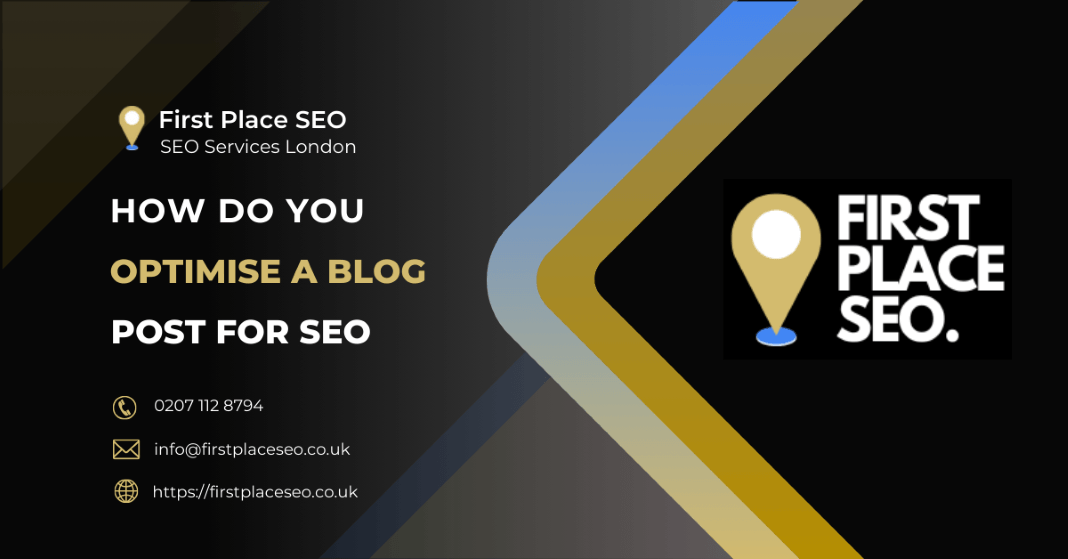What Is SEO and Why Is It Important for Blogging?
Search engine optimisation (SEO) is a key part of blogging. It’s not just about creating good content but ensuring your blog post is visible to people searching for related topics. Without proper optimisation, even the best content might go unnoticed. SEO plays a role in improving your blog’s search visibility on search engines like Google, helping you gain more organic search traffic.
When you optimise a blog post for SEO, you increase its chances of appearing in the top results on a search engine results page (SERP). Whether you’re a beginner or an experienced blogger, focusing on SEO strategy, improving blog ranking, and attracting more readers are key to success. By applying these techniques, you can make your blog stand out, attract more traffic, and build trust with your audience.
This guide provides actionable SEO tips and steps to help you optimise your blog effectively. It covers everything from finding the right SEO keywords to making your blog user-friendly and search engine-ready. If you’ve been wondering how to improve SEO for your blog, you’re in the right place.
How Do You Find the Best Keywords for Your Blog?
The first step in any SEO strategy is effective keyword research. Choosing the right SEO keywords ensures your blog reaches the audience searching for information you’re providing. Keywords are the terms people type into search engines, and finding the best ones can improve your search engine visibility.
Use tools like Google Keyword Planner, SEMrush, or Ahrefs to identify keywords with high search volume and low competition. Focus on long-tail keywords—specific phrases that are easier to rank for. For instance, instead of targeting “SEO,” a good long-tail keyword could be “SEO tips for beginners.”
Understanding search intent is also crucial. This involves analysing whether users are looking for information, products, or services when they use specific terms. Matching your content to user intent increases engagement and improves your rankings.
Include latent semantic indexing (LSI) keywords—related terms that give context to your content. For example, if your main keyword is “SEO tips,” related LSI keywords could include “optimise blog posts,” “boost search rankings,” or “SEO strategy.”
By finding the best keywords, considering search intent, and using semantic keywords, you’ll build a strong foundation for blog optimisation.
How Do You Write Titles That Rank Well?
Your blog title is a major factor in SEO. A well-written title can attract readers while signalling to Google and other search engines what your content is about. This improves your blog’s search engine visibility.
Start by including your main SEO keyword near the beginning of your title. For example, if your keyword is “SEO tips,” a strong title might be “10 SEO Tips to Improve Your Blog’s Ranking.” Using long-tail keywords in titles makes them more specific and easier to rank.
Make your title engaging by including emotional or descriptive phrases. Words like “simple,” “step-by-step,” or “essential” can make readers more likely to click, boosting your click-through rate (CTR). Titles should also be concise—keeping them under 60 characters ensures they appear fully in SERPs.
Incorporate descriptive phrases like “Beginner’s Guide” or “Expert Tips” to make your title clear and relevant. Using a combination of primary keywords and compelling language will help your title rank well and attract readers.
How Can You Optimise Your Blog Content?
Creating high-quality, optimised content is at the core of any successful SEO strategy. Start by incorporating your SEO keywords naturally throughout your blog. Place them in the first 100 words, headings, and several times in the body without overusing them, which could lead to keyword stuffing.
Structure your content with clear H1, H2, and H3 tags to improve readability and make it easier for both readers and search engines to navigate. Blog posts with a word count of at least 1,000 words tend to perform better in search engine rankings, so aim for in-depth, valuable content.
Add related semantic keywords like “content depth,” “on-page SEO,” or “blog readability” to give your post more context. This helps search engines understand your blog’s relevance and improves rankings.
Use bullet points, numbered lists, and short paragraphs to make your blog easier to read. Highlight key points with bold or italicised text to catch readers’ attention. These small formatting tweaks enhance the user experience and encourage readers to spend more time on your page, reducing bounce rates.
How Can You Optimise Images for Better SEO?
Images are more than just visual elements—they can improve your blog’s SEO when used properly. Start by using high-quality, relevant images that match your content. Compress the images to reduce their file size without compromising quality, as large files can slow down your site.
Add descriptive alt text for each image. Alt text helps search engines understand what the image is about and improves accessibility for visually impaired users. For example, an image about “SEO tips” could have alt text like “Checklist of SEO tips for blog optimisation.”
Rename image files before uploading them to include keywords. Instead of “IMG1234.jpg,” use names like “SEO-tips-for-beginners.jpg.” This helps your images rank in search results and adds relevance to your blog.
Why Are Internal and External Links Important for SEO?
Links connect your blog to related content, improving its search engine visibility and helping readers find more information. Internal links point to other pages on your website, guiding readers to relevant posts. For instance, in a blog about “SEO tips,” you could link to a related post on “Keyword Research Techniques.”
External links point to reliable, authoritative sources outside your site. Linking to credible websites like Google’s SEO Starter Guide shows your content is well-researched and adds value for readers.
Use descriptive anchor text that includes keywords to make your links more relevant. For example, instead of “click here,” use text like “learn more about keyword research.”
How Can You Keep Your Blog SEO-Optimised Over Time?
To keep your blog optimised, focus on consistent improvements. Regularly update your content with new SEO keywords, refresh links, and check for technical issues like slow page speeds or broken links.
By consistently applying these SEO tips, using semantic keywords, and optimising for search engines, your blog can grow in authority and attract more readers. Each small step contributes to long-term success in search rankings.


